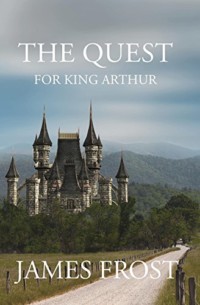Title: The Quest for King Arthur
Author: James Frost
Publisher: Toplink Publishing
ISBN: 978-1948262637
Pages: 246
Genre: Non-fiction
Reviewed by: Krista Schnee
Pacific Book Review
In writing history, scholars generally emphasize the information found in primary resources, those documents written during the period being studied. This approach lends itself well to eras in which there are many written sources from a variety of viewpoints. However, what if the focus of research has few documents? The search for King Arthur is one such study. Britain of the fifth and sixth centuries was a chaotic society with kings and other leaders vying for supremacy. Literacy was rare, and documentation of historical events was sparse.
As such, the pursuit of King Arthur can be unnaturally skewed toward one of two stances if the basis of the research are only the available resources. Historians have tended to view Arthur as either a historical or a mythical figure, with their preconceived notion guiding their writing. However, research can be done differently. It appears all resources were utilized in The Quest for King Arthur. The literature of the time is most likely biased and so must be read with that in mind. How can one fill the gaps in the information available of the time?
Researching such an era can be more accurate if a holistic approach is utilized. A study of linguistics and the archaeological record can be useful. Additionally, looking at the culture before and after an event will provide a certain perspective on a figure like King Arthur. For example, cultures tend to do things such as appointing a king in a certain way. Considering this trend in culture, one can hypothesize how Arthur rose to power and maintained his authority. Other events are consistent for all cultures, and so the lack of documentation need not limit research. All resources can be used as long as the available facts are cross referenced.
It is this holistic view of historical research that is proposed in James Frost’s The Quest for King Arthur. In his book, Frost offers historians a different way to pursue their research, one that incorporates all available sources of information. Indeed, the search for Arthur is a test case to prove the accuracy of this research method. Frost’s views provide interesting insights into the time in which Arthur might have lived. For instance, a gap in the lists of kings written at the time is not a deterrent for Frost. By looking at the cultural standards in fifth century Britain, he shows that the presence of peace in the middle of many years of war may indicate the rule of a strong king such as Arthur.
In The Quest for King Arthur, James Frost provides a new way to look at history. Although some may dislike his incorporation of myth and poetry, Frost uses those resources in addition to the more standard documentation in a balanced fashion, allowing for cultural trends even as he pulls relevant information from the ballads and stories. Viewing this with an open mind, the reader will be sure to find his arguments persuasive. Frost shows readers that the examination of the culture of the time in addition to other resources can provide greater understanding. James Frost’s The Quest for King Arthur in an interesting and thought-provoking study of King Arthur.



Follow Us